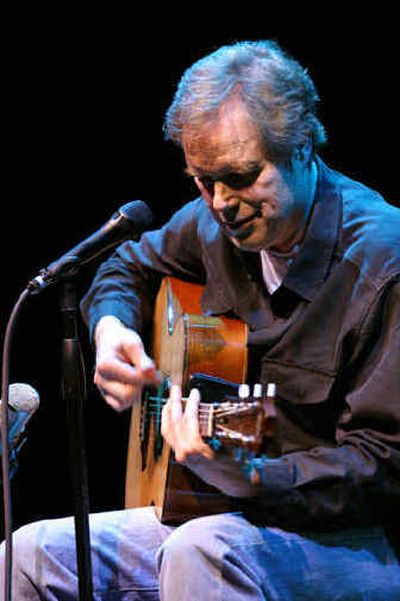Kottke brings unique style to Met

Listen to any of the early ‘70s albums by Leo Kottke and you will hear a guitar voice in full bloom.
The sound is youthful but learned. The tone is inviting, driving and clear. The technique? Simply monstrous.
Now put on “Try and Stop Me,” Kottke’s most recent album, released last June. While the opening “Monopoly” percolates with the same folkish fancy as those younger records, much of the album reflects a lighter, less frenzied pace. Yet even when the guitar work is at its most serene, as on “Mora Roa,” the emotive colors come in big, broad strokes.
Kottke dismisses the suggestion the album represents a pronounced development, or even advancement, of his guitar voice. He thinks such a voice has always been available to him. But developing a lasting and fruitful relationship with it? That’s another question.
“I’m not trying to be cute about it,” says Kottke, who returns to the Inland Northwest for a concert Sunday night at The Met.
“It’s in there and it hooks you,” he says. “You follow it, and eventually it follows you. The hard part is when it goes away and you have to look for it again. It’s always there, but it likes to play with you. You learn how to wait, how to behave, so it won’t be fickle.”
Fickle is probably the last word to describe Kottke’s music. An internationally renowned guitar stylist (and, in concert, a wry but engaging raconteur), Kottke’s ability to blend folk, country, classical, jazz, blues and numerous pop styles into an evolving, genre-less sound has regularly earned as much acclaim as his astonishing technical command of the guitar.
The best insight into Kottke’s music just might be the titles of his compositions: “Flattened Brain,” “I Yell at Traffic,” “A Low Thud,” “Grim to the Brim.”
Don’t expect Kottke to point out how these varied components fit together on record. Shoot, just getting him to listen to one of his albums is a chore.
“I don’t listen to the records I make,” he says. “Recorded music makes me so jumpy I rarely listen to any recordings. Usually I hear my own stuff when I’m in a broadcast interview somewhere. That can be dreadful or encouraging.
“I’ve got records – (1978’s) ‘Burnt Lips’ for example – that I hated when I finished them but that I liked when I heard them, usually by accident, 10 or 15 years later. All of which means I’m the last guy to ask. Or know.”
Though best known as a solo performer, Kottke has collaborated on records with Emmylou Harris, Rickie Lee Jones, Phish bassist Mike Gordon and many others.
While the first 10 tunes on “Try and Stop Me” are solo acoustic instrumentals, its finale is a regal cover of the folk favorite “The Banks of Marble,” recorded with the long-running roots-rock ensemble Los Lobos.
“I’ve worked with a couple of the individual guys in the past,” Kottke said. “But that didn’t prepare me for what you get with the whole band. More than 30 years of flat-out music and getting along with each other – that’s a beautiful thing to see.
“When they kick in around you, you’re getting every minute of those 30 years and more. All that experience is felt. It’s overwhelming to be in the center of it.”
The feeling from the Lobos camp is more than mutual.
“When you’re a young musician and you put on ‘Vaseline Machine Gun’ (a riotous instrumental from Kottke’s 1971 ‘6 and 12 String Guitar’ album), like I used to do a lot, the feeling is humbling,” said Los Lobos guitarist/drummer Louie Perez.
“You just want to burn your guitar and take up roofing. That’s how amazing a musician Leo is.”